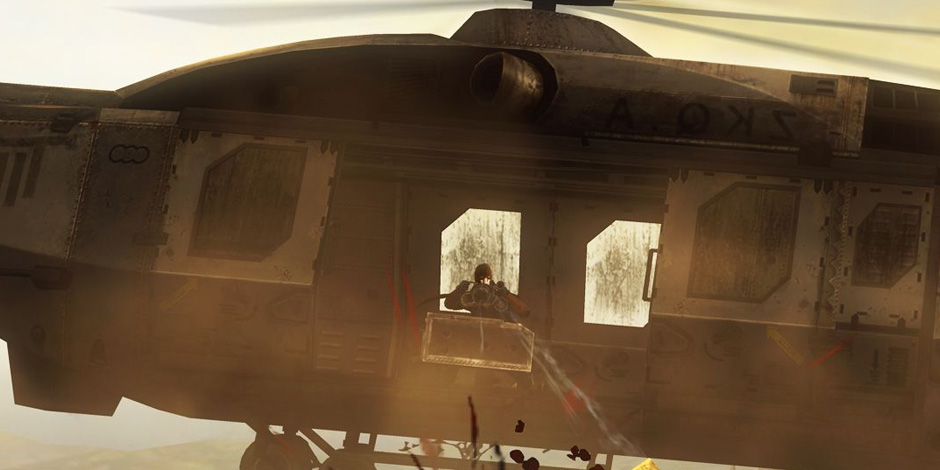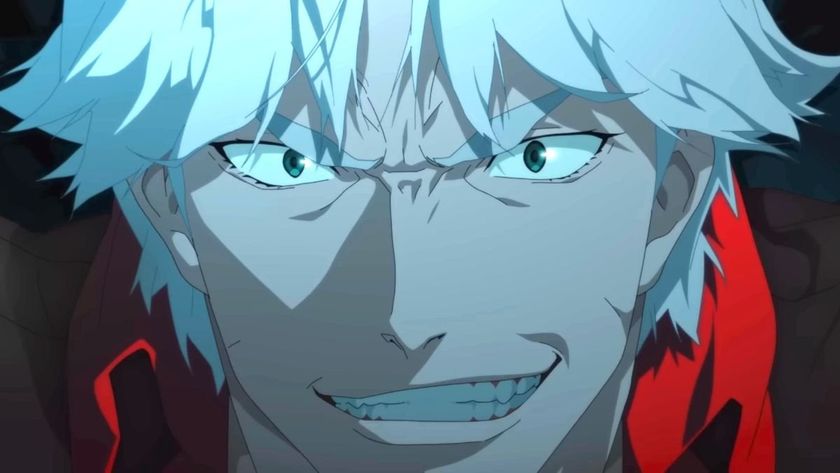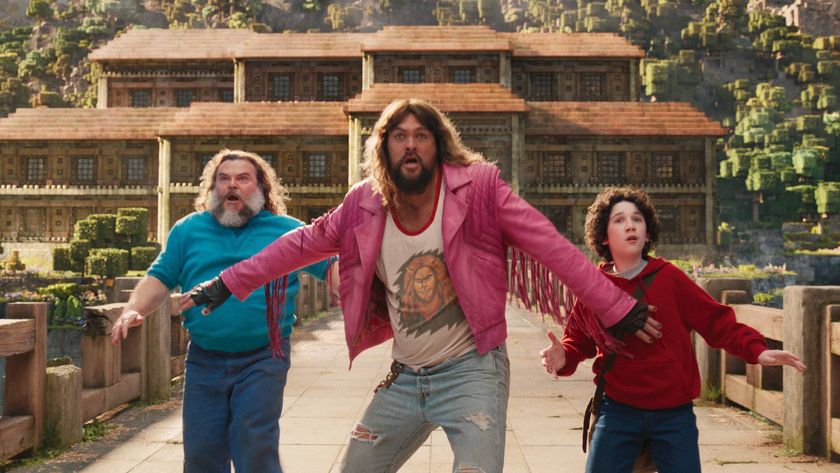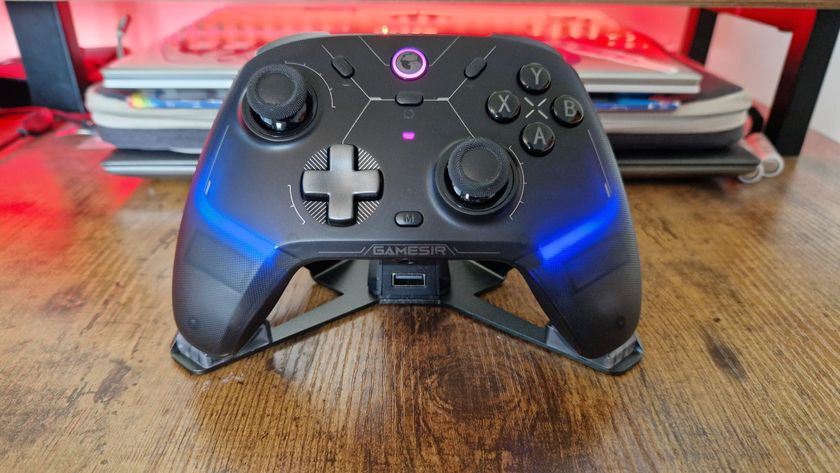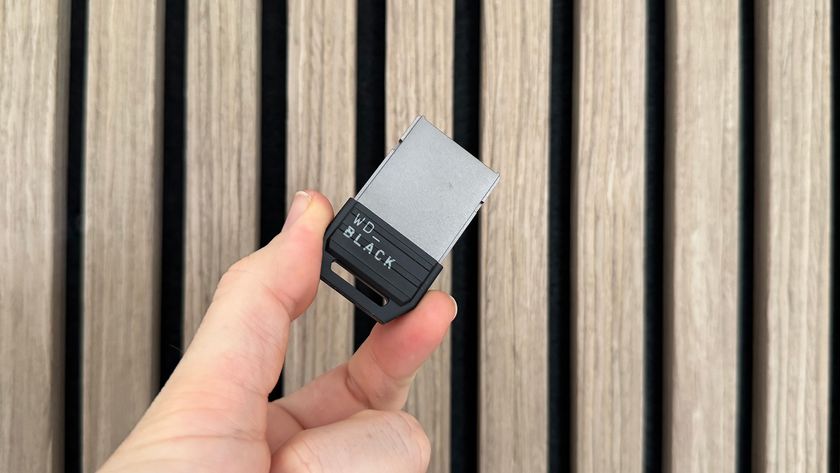GamesRadar+ Verdict
Pros
- +
Wildly intense firefights
- +
Overkill mode
- +
Co-op works well
Cons
- -
Forced
- -
dissonant humor
- -
Dumb enemies
- -
No competitive multiplayer
Why you can trust GamesRadar+
Everything is better with a friend--especially blowing up bad guys. It's here that Army of Two: The Devil's Cartel shines the brightest, glistening with blood and gibs, like a Michael Bay movie on steroids. This sequel isn't deep or all that innovative, but odds are you won't have time to complain while you careen from one bloody conflagration to another, with barely a moment to breathe or take stock, delighting in wildly violent action each step of the way.
Above all else, Army of Two succeeds in looking terrific in battle. Firefights are morbidly beautiful in intensity and chaos; the environments disintegrate around you as the bullets and rockets fly, and there are dozens of moments where you’ll pause for a moment to say, “wow--that looks cool”. A moment is all you’ll have, though, as the action in Devil’s Cartel is unrelenting and pervasive. Taking place in Mexico, memorable locales abound, from city plazas to gorgeous resort hotels to ancient churches and graveyards. By the end of each battle, though, they’re choked with bodies and body parts in every corner. The carnage is immense.
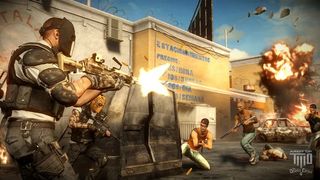
"The carnage is immense."
The death-dealing starts immediately and never stops as you and your partner (the more serious Alpha and Bravo, replacing the cartoony Salem and Rios from the last two games) dispatch wave after endless wave of drug cartel minions, each seemingly resigned to his fate as cannon fodder. While there is a story of sorts--a Mexican politician is trying to succeed in an area dominated by the cartel--it serves as only the narrowest thread to bring you to each of the set pieces as quickly as possible. Many follow a similar pattern, battling through enemies to get from point A to point B, but there are also some interesting vehicular missions to keep things fresh. Army of Two knows what it’s good at--namely, bullets, blood, and guts--and focuses on it like a laser beam.
Technically, a run-through of the game’s ten campaign locations takes 6-8 hours or so, but focusing on that utterly misses the point. Your first pass is a practice run that lets you learn locations and amass some cash to outfit yourself properly to do it again--and again and again. As a title focused on performance-based leaderboards, the ultimate victory is achieved by arming yourself and your partner to the teeth with tricked-out versions of the best weapons possible, then using smart tactics to earn top scores. Anyone can shoot a dude in the head, but properly flanking a group of enemies then blasting them to high heaven with a single rocket launcher scores quadruple the points. At the end of each level--some as short as a few minutes--your score is immediately assigned a number on the global leaderboards. Such is the ultimate hook of the game, and the reason to keep building your loadout and hopping back in to do just a little better each time.
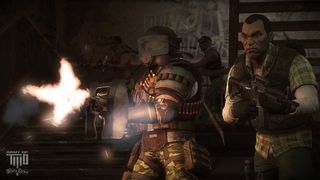
"...the ultimate victory is achieved by arming yourself and your partner to the teeth..."
The best way to get the highest scores is using the Overkill mechanic, which takes the already-bloody action to another level entirely. Overkill does several things--slows down time, makes you invulnerable, gives you infinite ammo and grenades, and makes those weapons chew through enemies with frightening results. Both you and your partner have their own Overkill to be used (they charge up over time), but when combined the powers are doubled and the scores are dramatically improved. The biggest challenge is figuring out when to use them; virtually every circumstance is a plausible one but it takes awhile for it to recharge.
One of the major disconnects with Army of Two is the intelligence--or lack thereof--of enemies. While some will seek cover, others will charge screaming while brandishing machetes. They will often stand idly nearby while you’re being revived and not capitalize on the chance to eliminate you. The other missteps are cosmetic. The ghastly carnage is occasionally peppered with forced dialogue between several of the characters, often trying to be a little funny; it simply doesn’t work as jokes are being dispensed at literally the same moment live grenades are landing at your feet. There’s no amount of humor that makes sense in the environment created here, as death and sadness are an overarching theme.
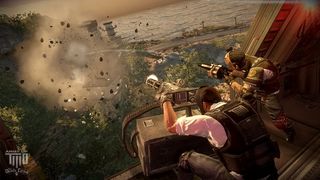
"One of the major disconnects with Army of Two is the intelligence--or lack thereof--of enemies."
The mechanics and controls are sound, with plenty of options to kill that work well. There’s no map, radar, or HUD; you simply follow indicators to figure out where to go and cower in a corner when it’s obvious you’re about to die. A few seconds without soaking up bullets and you’re good as new. When you do get taken down, there’s a generous amount of time for your buddy to heal you and keep going. Naturally, when you take all of this into account along with the staggering number of people that just two individuals mow down, it’s all utterly implausible. Army of Two throws plausibility out the window within the first five minutes, though, so it’s not really on the table in the first place.
Army of Two: Devil’s Cartel seems to accomplish exactly what it set out to do, offering an intense, impressive two-player co-op experience that’s heavily customizable and replayable. While it won’t likely scratch the itch of those looking for a more traditional shooter game--namely, competitive online multiplayer--it’s an original concept set inside familiar trappings.
This game was reviewed on Xbox 360.
More info
| Genre | Shooter |
| Description | The next entry in the co-op shooter series is getting a little more serious and is being made by some of the people behind Dead Space. |
| Franchise name | Army of Two |
| UK franchise name | Army of Two |
| Platform | "PS3","Xbox 360" |
| US censor rating | "Mature","Mature" |
| UK censor rating | "","" |
| Release date | 1 January 1970 (US), 1 January 1970 (UK) |
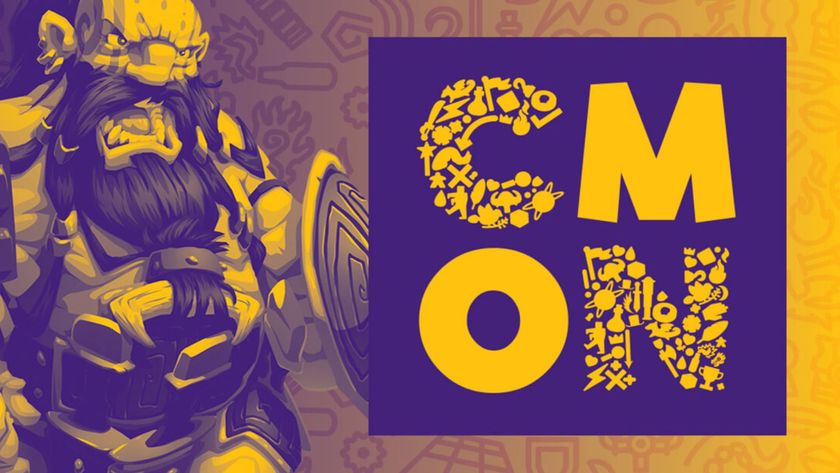
Board game fans voice concerns as Zombicide publisher CMON fails to publish annual returns on time due to understaffing

I'm willing to give Switch 2 mouse controls a chance, but only if they avoid the sins of the Lenovo Legion Go
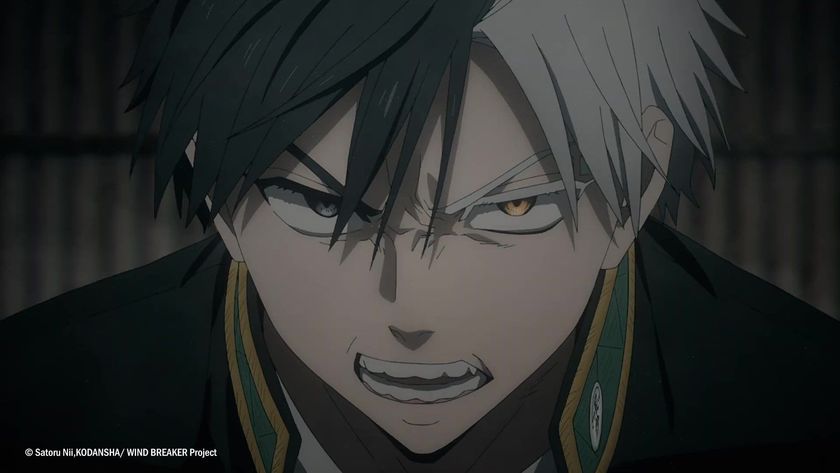
Wind Breaker season 2 release schedule – when is episode 1 on Crunchyroll?
